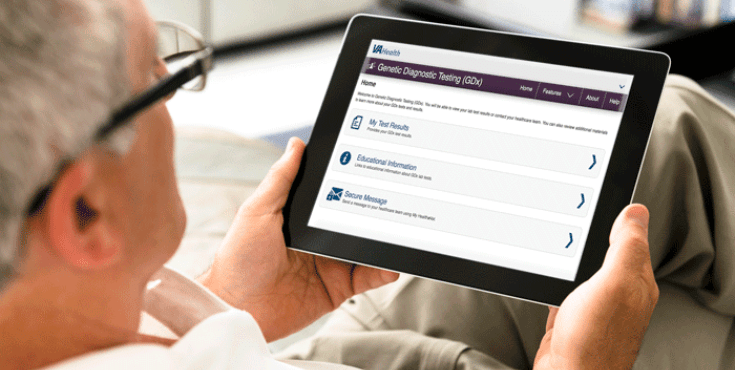When a new system being field tested this summer goes live, VA will become the first U.S. health care organization ever to put genetic testing data into the hands of patients via a mobile application.
The system, named Genetic Diagnostic Testing App — called GDx — will put individual genetic information in the hands of Veterans – providing them with access to their information anywhere, anytime, as well as the ability to share it with VA and non-VA providers alike. In short, medical professionals will be able to provide highly-individualized care and better treat their patients.
To explain a bit more in detail, GDx project leads Dr. Michael Icardi, national director of VA Pathology and Laboratory Medicine Science, and Dr. Julie Lynch, nurse research scientist at VA Informatics and Computing Infrastructure answered the following questions about this initiative.
Question: What is the current landscape of clinical genetic testing at VA?
Answer: VA is one of the country’s largest consumers of clinical genetic testing, and it has been on the forefront of developing informatics systems to ensure appropriate use of precision medicine. Currently, if Veterans are sent for clinical genetic testing, in most cases their specimen is sent to a commercial laboratory outside of VA. Test results are then sent to the VA clinician through a 10-12 page faxed report. Sometimes these tests are single gene tests, other times these tests are gene panels that analyze anywhere from 100 to 300 genetic variants to determine whether the Veteran has clinically actionable mutations. This data is not currently standardized or stored within Veterans Health Information Systems and Technology Architecture (VistA), so it’s not easily searchable within the medical record. In addition, if Veterans go elsewhere for care, then they have to fill out forms for the facility to request hard copies of those reports. The same is true for Veterans tested on the outside coming into the VA system. They have to remember where the test was done and fill out a request for the information to be sent to VA. That takes time. If the facility can’t get the reports soon enough, then the patient has to be retested.
Q: How does GDx change this?
A: The GDx backend is the system that captures the data, indexes it and makes it computable. Both VA and outside labs send their data to GDx. So, using the provider version of the app, a VA clinician can pull up the data, regardless of where it was done. But even better, the Veteran version of the app puts the information into the hands of Veterans. Now, they can walk in the door at a cancer facility, for example, and say “Here is my information. Let me Airdrop it to you.” It becomes a patient-mediated data exchange – the patient is now in control of this specialized data.
Q: Why is having this genetic data in your pocket so important?
A: A patient’s genetic data informs diagnosis, prevention and treatment of several diseases, so it is extremely important that both patients and their health care providers understand whether patients have a clinically actionable genetic variant. Delivering this directly to the patient via an app is something that no other health care organization has done. It’s historic and will be life changing for the Veteran. This makes individualized care, that is, personalized medicine a reality for Veterans. It puts the power of diagnosis and treatment in their hands.
Q: Can you explain further what you mean by that?
A: I can offer three examples. First, let’s say you’ve been diagnosed with cancer. They’ve done the molecular genetic tests to identify tumor mutations. This allows you to find the best treatment program for your cancer. Treatments, such as immunotherapy, can be ordered based on the genetic characteristics of your particular tumor. There is no more one size fits all.
But this isn’t just for cancer. Here’s a second example. GDx creates a database that pharmacists can access to make prescribing decisions. If you’re a Veteran, they might order a drug metabolism profile for you. They can then look at whether you’re a fast metabolizer of codeine versus a slower metabolizer, for example, and customize your dosage accordingly.
Finally, for those who have an infectious disease – hepatitis or HIV, for example – the genetic information pinpoints what your treatment options should be. You can take a New York City workup with you to Iowa. It makes treatment uniform across the board.
Q: Are there long-range benefits to collecting and storing this genetic information?
A: Absolutely. Before, we only kept the information that was pertinent to the clinical issue at the time. Now, with GDx, in five or six years when genetic research reveals more to us, we’ll be able to go back and look at a patient’s data afresh and generate an updated report. This really is assembling a genetic testing database that will be available for future clinical analysis to directly benefit the patient.
The GDx team’s goal is to wrap up the last leg of development by the end of August. Stay tuned for more information about GDx in the coming months. Both the provider and Veteran versions of the app, as well as extensive training materials, will be available on the VA App Store when the system goes live nationwide.
About the author: This blog was submitted by the Veterans Health Administration’s Office of Connected Care.
Topics in this story
More Stories
Seven U.S. Army soldiers, one Army Reserve soldier and two Veterans are representing Team USA at the 2024 Olympic Games in Paris, which begins today.
Study underscores important role COVID vaccination can have in protecting Veterans from infection and reducing long-term health consequences
Columbia VA’s robotic surgery teams completed their 800th robotic surgery and are on schedule to hit 1,000 by the end of the year.







I would be interested in this endeavor ,but there is always question’s that need to be answered maybe not now but in future pertaining to this VanTage Point app. Will be be notified when it goes to reality? What are the insurances of protecting this vital information that is our ” life’s blood”?
Is there a direct mailing list or does there need to be for signup?
How can I became part of this?
This is impressive.
I find it interesting That the VA is working to improve the Genetic testing and info gathering and storage. I have become interested autoamune diseases, and would like to be included in any work. I have also been working with the 23 andme study.
Outstanding!
It sounds very interesting, I would love to be part of the test. I wonder when it will be available to all veterans.
Thank you,
Randy
Any disorder which is genetically derived would be considered a service connected disorder?
I have a few questions.
Is there any connection to the VA Million Veterans Program.? I donated blood for that program.
Will I be notified of any results? So I know my genetic information has been recorded?
I don’t have any problems with my own blood testing.
Some people might. Because it’s sensitive personal information.
But if you volunteered for the Million Veterans Program. You already signed the release of information.